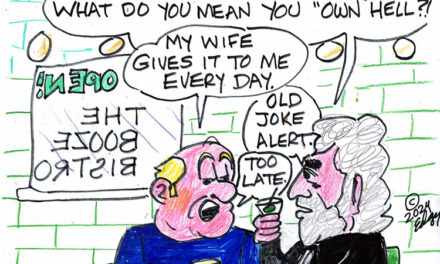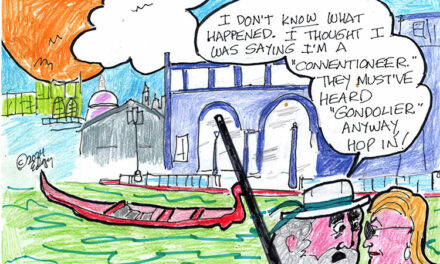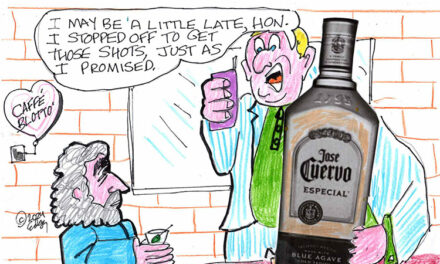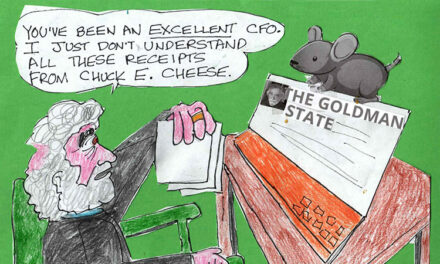A new Goldman State Podcast drops every Friday!
Insults but No Injuries: The Perfect Pre-July 4th Read
Why did analyzing someone have to become so, like, analytical?
By Ed Goldman
Inspired by tomorrow’s being Independence Day, I was thinking of how a few generations back American life was so much easier when you thought a guy was acting like a jerk. You’d say, “You’re acting like a jerk.” You didn’t say he was being “narcissistic” (especially if you had a lisp) or “solipsistic” (ditto).
Someone who was sad wasn’t always “depressive.” “Moody” didn’t always reach all the way to “bi-polar.” And someone who was quirky or kooky didn’t have to be characterized as “borderline autistic.” (Once he crossed that borderline, of course, he was “on the spectrum.” How many creative or unsociable people do you know whom you’ve heard so-designated—by people with zero knowledge of autism? They’re the same ones who use “toxic” as a verb, noun, adjective and default.)
Siggy stardust
Over the past 35 years or so, an increasing number of people began to seek psychotherapy to deal with their problems, which sounded like a healthy trend. But many of them felt that because they’d participated in some version of what Freud called the “talking cure” it was incumbent upon them to strongly suggest you do the same. This is when a garden-variety jerk could start getting accused of a garden variety of disorders—including anxiety, behavioral, dissociative, eating, obsessive compulsive and the ultimate unhappy meal, paranoia.
Then there are all the maladies that begin with the word “self” and deploy a sly hyphen.e.g., self-absorbed, -obsessed, -involved, -concerned, -interested, -serving, -preoccupied, -regarding, -loving, -oriented, -seeking, and -infatuated.
All of these—which I copied and pasted from Roget’s Thesaurus, not “Psychology Ptoday,” as National Lampoon once spelled it—mean the same thing as “egotistical.” This is what narcissists used to be called until Mental Health Days were included with our company benefits and our vocabularies upped their game. All those self- words may even be a little more daunting than “conceited,” the then-harsh word we used in high school to define anyone who was better looking than we were and dated the people we wanted to date.
Some of the old-time insults could be just as pointed but, I admit, sounded a bit less scholarly. Like birdbrain, blockhead, schnook, clod, fathead, doofus and idiot stick (we’d call someone the latter if we surmised that somewhere along the way he’d been struck by one). Then there were all the nouns that could follow the word “ass,” none of which could be considered complimentary. In addition, a number of adjectives could precede “ass” and still hit the mark, such as “wise” and “smart.”
Yiddish—the German dialect that serves as the “streets” patois of my people (if you’re just joining us, they aren’t Episcopalians)—contains a raft of insult words. They include: “chazer” (a piggy person. It’s pronounced by clearing your throat then saying “ah-zer”); “farshtunkener” (someone with lifelong b.o.; the stress is on the “shtunk” part—as well as anyone in a small, hot room with the farshtunkener), and “schlub” (a lazy slob, by any other name).
Every culture has its own set of insult words, but they rarely feature what we might think of as elevated language. For example, the website Reddit—a word I’ve always thought should be followed by “But liked the movie better”—lists these British insults: “chuffer” (this one’s versatile: it can mean “someone fat, someone who borrows money, someone generally untrustworthy” and even a braggart); “tosser” (someone who’s plain obnoxious); and “minger” (an “exceptionally unattractive person”) To me, “minger” sounds like someone who mings, whatever that means, just as Kipling is best explained by someone who actually Kipples.
I have a lot more of these to discuss but the sun’s shining temptingly through the blinds in my office so I’m afraid I’ll have to be a schlub. I wish you all a wonderful Fourth of July. May the Fifth of Same find you with all your fingers.
Ed Goldman's column appears almost every Monday, Wednesday and Friday. A former daily columnist for the Sacramento Business Journal, as well as monthly columnist for Sacramento Magazine and Comstock’s Business Magazine, he’s the author of five books, two plays and one musical (so far).











